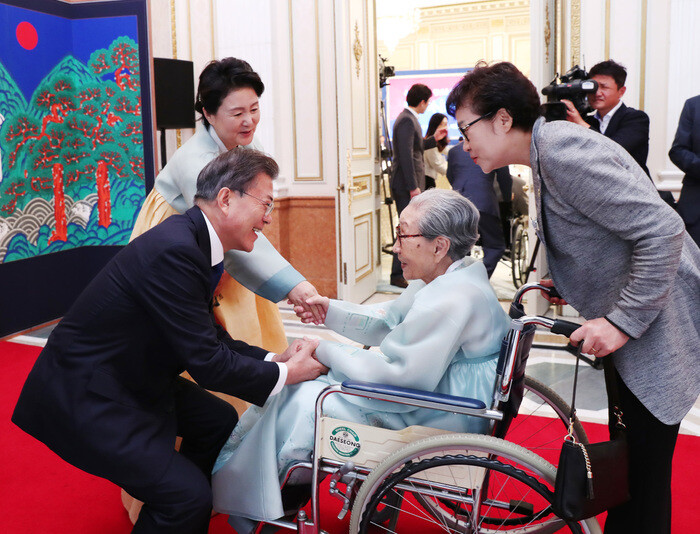hankyoreh
Links to other country sites 다른 나라 사이트 링크
[Editorial] Time to properly honor independence activists and their families

As we celebrate the 72th anniversary of Korea’s Independence, we remember the noble dedication of those patriots who sacrificed themselves for the cause of their homeland’s independence. The Republic of Korea would not have existed as it does today were it not for the independence fighters who fought body and soul against the Japanese empire’s colonial occupation. It was a bitter life these fighters led, sacrificing their own future prospects and even the welfare of their family members by exposing themselves to all manner of hardship. Their ordeals and suffering did not stop with them: their poverty was handed down to descendants who lost the chance for a proper education, leaving us with the undeniable reality encapsulated in the lamentable saying, “For independence fighters, three generations fail; for collaborators, three generations prosper.”
In that sense, it is of deep significance that President Moon Jae-in invited independence activists and victims of forced mobilization under the Japanese empire and their surviving family members to the Blue House on Aug. 14 to pledge “suitable treatment through the third generation of independence activists.” In the past, compensation for the activists’ children and grandchildren had depended on factors such as when the activism had taken place or when the parent or grandparent had been designated a person of merit, raising issues of fairness as well. In some cases, people suffered discrimination because of socialist affiliations. It’s fortunate that the administration is taking action to rectify this. The fact that some grandchildren of independence activists have continued to enjoy respectful treatment while others have not is a matter of great shame.
It has also been reported in the press that 5,469 of the 14,651 national medal citations issued to independence activists to date remain in storage at the Ministry of Patriots and Veterans’ Affairs, having never been delivered to the surviving family members. One has to ask what the point of announcing a decoration is if it is never passed on to the descendants. The government has visited family members personally to deliver decorations just 287 times in the last five years. Can we really speak of it as having done a proper job of recognizing patriotic service?
The government also reportedly plans to hold burial ceremonies for recognized independence activists, affording them respectful and dignified treatment by the state. Of the 15,000 or so people recognized for their independence service, just 58 are still alive today. As long as even one of them remains alive, it is the state’s unquestionable responsibility to suitably recognize their honorable contributions. The administration needs to quickly revise its system for recognizing and compensating patriotic service so that practical benefits are passed on to independence activists and their descendants.
Suitable policies for recognizing patriotic service are the first step toward achieving national unity. It is hard to expect dedication from members of a society where people are not respected or compensated for the sacrifices they make for the community. The year 2019 will mark the 100th anniversary of the founding of the Republic of Korea and the provisional government. The scars from our failure to properly address the legacy of Japanese collaboration remain wide and deep. The government must not neglect its duty to ensure that independence activists and their descendants can live proud and honorable lives.
Please direct questions or comments to [english@hani.co.kr]

Editorial・opinion
![[Column] Season 2 of special prosecutor probe may be coming to Korea soon [Column] Season 2 of special prosecutor probe may be coming to Korea soon](https://flexible.img.hani.co.kr/flexible/normal/500/300/imgdb/original/2024/0426/3317141030699447.jpg) [Column] Season 2 of special prosecutor probe may be coming to Korea soon
[Column] Season 2 of special prosecutor probe may be coming to Korea soon![[Column] Park Geun-hye déjà vu in Yoon Suk-yeol [Column] Park Geun-hye déjà vu in Yoon Suk-yeol](https://flexible.img.hani.co.kr/flexible/normal/500/300/imgdb/original/2024/0424/651713945113788.jpg) [Column] Park Geun-hye déjà vu in Yoon Suk-yeol
[Column] Park Geun-hye déjà vu in Yoon Suk-yeol- [Editorial] New weight of N. Korea’s nuclear threats makes dialogue all the more urgent
- [Guest essay] The real reason Korea’s new right wants to dub Rhee a founding father
- [Column] ‘Choson’: Is it time we start referring to N. Korea in its own terms?
- [Editorial] Japan’s rewriting of history with Korea has gone too far
- [Column] The president’s questionable capacity for dialogue
- [Column] Are chaebol firms just pizza pies for families to divvy up as they please?
- [Column] Has Korea, too, crossed the Rubicon on China?
- [Correspondent’s column] In Japan’s alliance with US, echoes of its past alliances with UK
Most viewed articles
- 1‘We must say no’: Seoul defense chief on Korean, USFK involvement in hypothetical Taiwan crisis
- 2[Column] Season 2 of special prosecutor probe may be coming to Korea soon
- 3N. Korean delegation’s trip to Iran shows how Pyongyang is leveraging ties with Moscow
- 4Korea sees more deaths than births for 52nd consecutive month in February
- 5Amnesty notes ‘erosion’ of freedom of expression in Korea in annual human rights report
- 6[Reportage] On US campuses, student risk arrest as they call for divestment from Israel
- 7[Editorial] New weight of N. Korea’s nuclear threats makes dialogue all the more urgent
- 8‘Weddingflation’ breaks the bank for Korean couples-to-be
- 9[Column] Has Korea, too, crossed the Rubicon on China?
- 10[Column] Park Geun-hye déjà vu in Yoon Suk-yeol